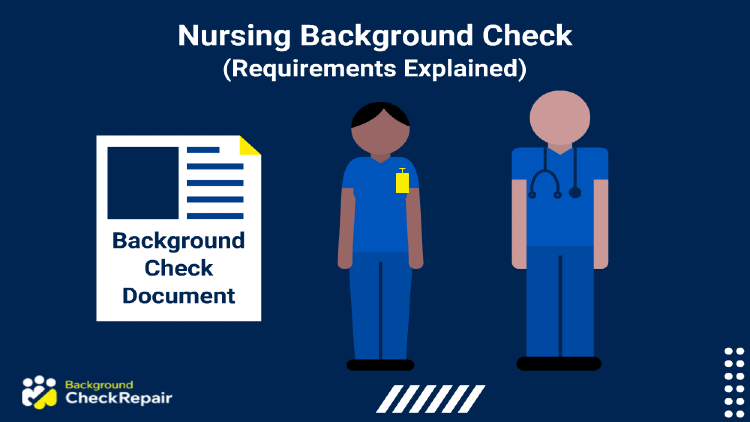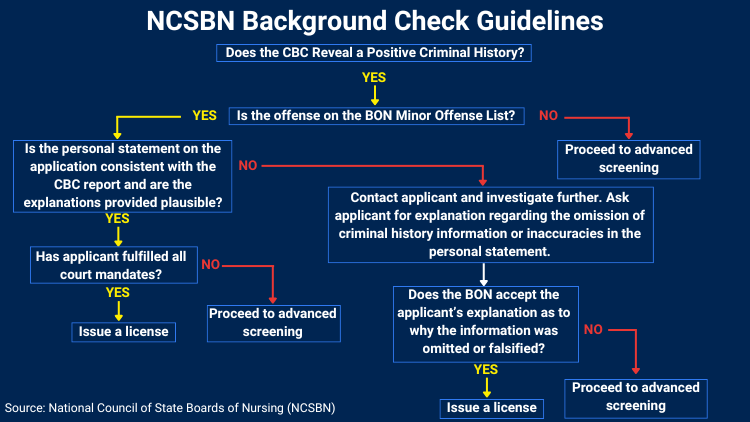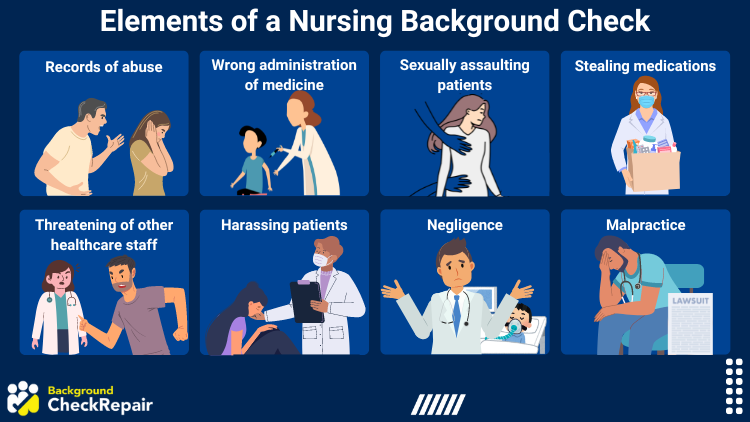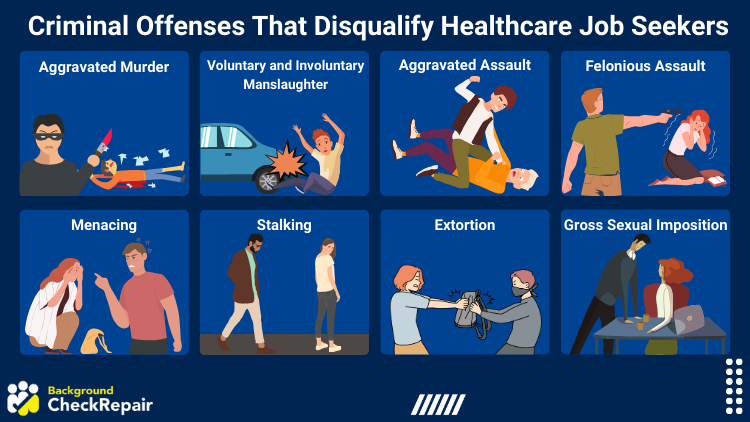We use cookies to ensure that we give you the best experience on our website. If you continue to use this site we will assume that you are happy with it
Nursing Background Check: Requirements in 2023 Explained
 Written by Background Check Repair
Written by Background Check Repair
Background Checks | May 13, 2024

Table of Contents
A nursing background check is an important and relevant screening process. In the healthcare industry, it’s indispensable that the people working daily with those most vulnerable are indeed who they say they are, and as qualified as they claim to be.
And if you’re a nurse or will soon be a nurse, you should know what background checks reveal and how the laws work.
Healthcare is an important industry and has strict guidelines and steps that must be followed in order to perform a successful nursing background check. These will protect you from lawsuits, criminal behavior, and financial liability in case of malpractice or other problems that might stem from providing incorrect care to vulnerable groups.
National Council of State Boards of Nursing Background Check Guidelines
The NCSBN has very strict guidelines that must be followed when running a nursing criminal background check in order to remain in compliance with the BON (Board Of Nursing), the EEOC, Title VII,2 as well as with other organizations pertaining to the healthcare industry and other medical professionals.
Nursing Criminal Background Check Steps
All applicants must submit a criminal background form, including misdemeanors, felonies, or plea agreements. If they do have a criminal background, they must submit an explanation as to the nature and circumstances of all offenses.
This application form must also contain written consent provided by those about to be screened in order to remain in compliance with the law.
1. Compile a List of Misdemeanors That Are Not Taken Into Consideration for the Application Process.
These include noise violations, minor possession of tobacco, littering, etc.
2. Implement the Following Pathway of Investigation:

3. Complete a More Thorough Investigation.
While some crimes and offenses can be dealt with by the BON, there are some others that call for more thorough investigation and consideration, such as:
- Crimes of a sexual nature
- Substance abuse
- Serious offenses
- A lack of disclosure of minor offenses from the applicant.
4. Perform a Risk Assessment.
Once all the aforementioned information has been considered, the BON will perform a risk assessment to determine whether the person about to be licensed to exercise their nursing qualifications in a determined state poses a risk to themselves, or those under their care. These assessments will be conducted under the supervision of a trained psychologist or other professionals in that area.
5. Complete Psychological Testing.
As an additional fail-safe, during these assessments, applicants must also pass a psychological and personality test, both of which are ADA (American Disabilities Act) and EEOC (Equal Employment Opportunity Commission) compliant.
Required Information for a Nursing Background Check
Both nursing and nursing home background checks for those working with elderly people must be extensive in order to protect vulnerable people from potentially dangerous applicants who will be in contact with them on a daily basis. But what are the requirements for a records check for these purposes?
The more bases you cover when screening nurses for a job opening, the less likely you’ll be to encounter an unfortunate situation. Most nursing background checks include, but are not limited to:
- SSN validation.
- SSN tracing (previous names and addresses of an applicant based on credit reports).
- County Criminal, Felony, and Misdemeanor Records Search
- National Sex Offender Registry Search
- License and Professional credential verification and tracking
- Urine drug tests
- DMV record check
- Educational attainment validation
- Professional reference check
In addition to the aforementioned elements, some positions will require OIG (Office Inspector General), GSA (General Services Administration), and FACIS (Fraud Abuse Control Information System) checks, which will provide an in-depth look into LEIE (List of Excluded Individuals), and EPLS (Excluded Parties List System), where individuals with records of elder abuse, or other offenses will show up.
Failing to properly perform a nursing background check will subject employers to an unending list of problems ranging from $10,000 in fines to revocation of Medicare, and Medicaid privileges, as well as jail time.
What Is FACIS?
Fraud Abuse Control Information System, or FACIS, is a security procedure comprising different levels of authentication to ensure that healthcare providers such as nurses, and nursing home workers have a clean record and will not endanger those under their care in the performance of their duties.4 FACIS can be broken down into four (4) levels:
- Level 1: A research process that complies with OIG guidelines, and includes OIG, GSA, DEA, FDA, PHS, ORI, TRICARE, and OFAC-SDN federal data, as well as Medicare Opt-Out.
- Level 1M: The minimum standard for every organization that receives government funds. This level includes the same as Level 1, along with records of Medicaid sanctions, and state-level procurement/contractor debarment sources.
- Level 2: Includes all the information included in the previous two levels, along with specific statewide information that might seem relevant to the hiring process.
- Level 3: Includes all the information and sources contained in the aforementioned levels, as well as databases of sanctioning boards of all 56 U.S. jurisdictions.
Anti-Discrimination Laws and Equal Protection Laws in Nursing Background Check Requirements
Nurses and other healthcare workers, just like every other modern professional, are entitled to not being discriminated against and having their interests protected to the extent the law allows.
It can be tricky to properly perform a nursing criminal background check while remaining in compliance with Title VII, FCRA (Fair Credit Reporting Act), and EEOC (Equal Employment Opportunity Commission) guidelines; however, as challenging as this may be, it’s not entirely impossible.
As you probably know, the Equal Protection Rights under the 14th Amendment provides a safe haven to avoid discrimination of workers and applicants during a criminal background check investigation.1
While it can be difficult for an applicant to prove that they’re being discriminated against, your best bet to avoid these kinds of complaints will always be to have defined, clear company background-checking policies in place to ensure that every applicant is held and evaluated under the same standards, regardless of their race, sex, ethnicity, religion, disabilities, marital status, place of origin, etc.
How Far Back Do Nursing Background Checks Go?
If you’re unsure as to how far back nursing background checks go, you’ll be surprised to find that, for most states, the allowed window of review is 7 years. As it happens with almost every job position in the US, this period is the maximum amount of time you, as an employer, can consider any important offenses in an applicant’s criminal background.
That being said, there may be some special cases, as it happens regularly in nursing home applications, where candidates can be subjected to more extensive reviews that span much farther into their past to rule out red flags and offenses that might put the vulnerable people under their care in jeopardy.
What Criminal Records Show Up on a Nursing Background Check?
Being healthcare providers in such a delicate area of work, it’s very important to know every little detail about a nurse’s past and record. Nursing criminal background checks will look into the elements of a regular criminal background check, as well as:

- Records of abuse
- Wrong administration of medication
- Sexually assaulting patients
- Stealing medications
- Threatening of other healthcare staff
- Harassing patients
- Negligence
- Malpractice
What Personal Records Are Used on a Nursing Background Check?
Personal records during a nursing background check are used to determine an applicant’s ability to provide care to vulnerable groups, as well as to ensure that they won’t harm those they work with on a daily basis in the performance of their duties.
Through this information, you, as an employer, can determine if someone is truly who they claim to be, and if they have any red flags in their personal and professional history you should be concerned about.
What Do Nursing Background Check Questions Uncover?
Nursing background check questions are very useful when trying to screen an applicant and determine if they’re the right fit for a specific position or caring for a person in need. Nursing background check questions are designed to uncover not only a healthcare professional’s interaction and care-providing outcomes but also their proneness to violent behavior or other tendencies that might endanger vulnerable individuals. These questions will help decide if:
- An individual can care for other people
- Their professional license is real and updated
- They have no criminal background
- They have never been implicated in elderly abuse
- They have no history of applying wrong medications or negligent malpractice
How Long Do They Take?
A common question in the nursing world is about the length of time it takes for a background check to complete. Most nursing background checks are run through national, and federal databases, so times may vary greatly. Depending on the depth of the investigation, results for a nursing background check could take anywhere between 4 days (if there are no hiccups), to 2 months if there’s a need to run an applicant’s name through several federal platforms.
Are Nursing Home Background Checks Different From Nursing Background Checks?
The answer is a bit complicated. While they’re both conducted under very strict standards and thoroughly reviewed, there are some differences regarding how deep every area of interest is researched and inquired about. Some of the most common specific questions you’re more likely to encounter when applying for a nursing home position are:
- Records of homicide and assault
- Sex offenses
- Theft and Fraud
- Domestic Violence
- Conspiracy and Fraud
- Drug trafficking or consumption
- Adulteration of food
What Do Nursing Homes Look for in a Background Check?
A high-quality nursing home background check will tell you everything you want to know about an applicant. From their professional experience and the validity of their credentials to brushes with the law, DUIs, court appearances, and other crimes.
The most important thing employers and people looking for healthcare providers want to know through these investigatory processes is whether the person they’re hiring will care and protect those placed under their wing, or endanger them and put them in a position no sick or vulnerable individual should have to go through.

There are some disqualifying offenses that will render a candidate automatically ineligible for a healthcare position, some of them are:
- Aggravated Murder
- Voluntary and Involuntary Manslaughter
- Aggravated Assault
- Felonious Assault
- Menacing
- Stalking
- Extortion
- Gross Sexual Imposition
The Ohio BON has a comprehensive list of all the applicable disqualifying offenses.3
Nurses are an essential part of society, without them, hospitals would collapse, and nursing homes would simply be impossible to maintain. These healthcare providers are the backbone of every care-dedicated institution, and their labor is vital.
This is why it’s indispensable to guarantee that anyone who will have vulnerable groups under their care is qualified and authorized to exercise their professional licenses without endangering others. People’s lives and well-being are a serious matter, so in order to remain in compliance with the law and guarantee the best service is provided, nursing background checks must always be a part of the hiring process.
References
1Congress.gov. (2024). Fourteenth Amendment Equal Protection and Other Rights. Constitution Annotated. Retrieved May 7, 2024, from <https://constitution.congress.gov/browse/amendment-14/section-1/#:~:text=No%20State%20shall%20make%20or,equal%20protection%20of%20the%20laws.>
2National Council of State Boards of Nursing. (2024). Criminal Background Check (CBC) Guidelines. NCSBN.org. Retrieved May 7, 2024, from <https://www.ncsbn.org/public-files/FINAL_14_CBC_Guidelines_052914.pdf>
3State of Ohio. (2021, April 12). List of Potentially Disqualifying Offenses. Ohio Board of Nursing. Retrieved May 7, 2024, from <https://nursing.ohio.gov/wps/wcm/connect/gov/811d2b7b-6f33-426b-a107-8778ebab4c21/List-of-Potentially-Disqualifying-Offenses-4.12.2021.pdf?MOD=AJPERES&CONVERT_TO=url&CACHEID=ROOTWORKSPACE.Z18_K9I401S01H7F40QBNJU3SO1F56-811d2b7b-6f33-426b-a107-8778ebab4c21->
4Verisys. (2024). FACIS® Data Supersource. Verisys. Retrieved May 7, 2024, from <https://verisys.com/solutions/facis/>
